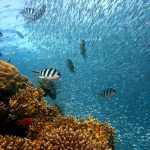 May 6, 2019 3:19 pm
Published by Climate Extremes
May 6, 2019 3:19 pm
Published by Climate Extremes
In this project, the selected student will use a one-dimensional numerical ocean model to simulate and understand the physical and biogeochemical processes in the ocean near Australia. The student will utilise the long-term oceanographic measurements conducted at one of the National Reference Stations maintained by the Australian Integrated Marine Observing System (i.e., the Maria Island, the Port Hacking, and the Rottnest Island).
 May 3, 2019 1:00 am
Published by Climate Extremes
May 3, 2019 1:00 am
Published by Climate Extremes
This project aims to learn more about the 1888 Centennial Drought using palaeoclimate information, documentary records, station based data and gridded datasets.
 September 18, 2018 9:59 am
Published by Jenny Rislund
September 18, 2018 9:59 am
Published by Jenny Rislund
Climate change is affecting weather patterns in many locations. In East Africa, changing rainfall would challenge the livelihoods of farmers. However, perceptions of local farmers and data from local weather stations differ. Is rainfall changing? How can we understand these two important information sources?
 August 14, 2018 6:29 pm
Published by Climate Extremes
August 14, 2018 6:29 pm
Published by Climate Extremes
How does the connection between Antarctica and Australia change over time? This project will help us understand Australia’s long term climate history and the range of extreme rainfall Australia experiences by exploring this connection.
 August 14, 2018 6:27 pm
Published by Jenny Rislund
August 14, 2018 6:27 pm
Published by Jenny Rislund
Using France as a case study, this project aims to create a climatology of heatwaves and droughts to investigate possible connections with voting patterns. The ultimate goal would be to help predict voting patterns in the future and to see whether the techniques could be applied more widely to other countries.
 August 14, 2018 6:25 pm
Published by Climate Extremes
August 14, 2018 6:25 pm
Published by Climate Extremes
In this project the vacation scholar will use models, observations and theory to better understand the processes driving ocean heat uptake in the Southern Ocean, with particular applications to sea-level rise.
 August 14, 2018 6:22 pm
Published by Climate Extremes
August 14, 2018 6:22 pm
Published by Climate Extremes
We seek a student to help develop a simple mathematical model to describe the ocean’s octopus like shape and what the movement of its tentacles tells us about climate change.
 August 14, 2018 6:16 pm
Published by Climate Extremes
August 14, 2018 6:16 pm
Published by Climate Extremes
What would happen if we suddenly warmed the ocean at the sea-surface? Would suddenly cooling it down cause an equal and opposite response? The student will work towards developing novel theories to describe the ocean’s response to extreme perturbations. These theories are needed to understand the ocean's role in transient climate change.
 August 14, 2018 6:08 pm
Published by Climate Extremes
August 14, 2018 6:08 pm
Published by Climate Extremes
This research aims to explore subtropical mode water in the South Atlantic and investigate the physical processes behind its formation and variability.
 August 14, 2018 5:59 pm
Published by Climate Extremes
August 14, 2018 5:59 pm
Published by Climate Extremes
This project will use output from a large ensemble of state-of-the-art climate models to examine changes to the Indian Ocean circulation and how it links to changes projected for the Pacific and Atlantic basins and surface winds.










